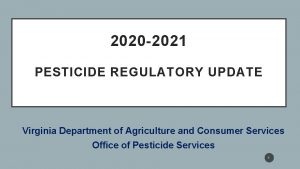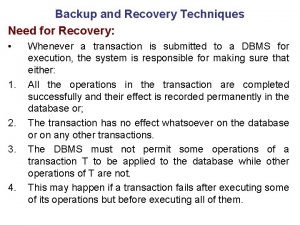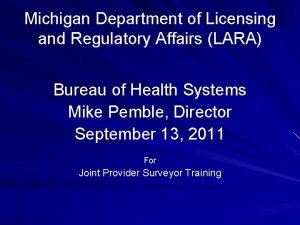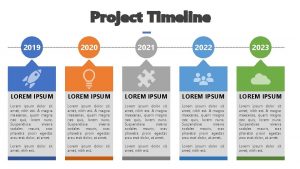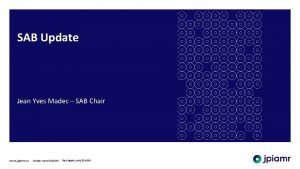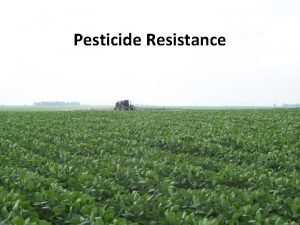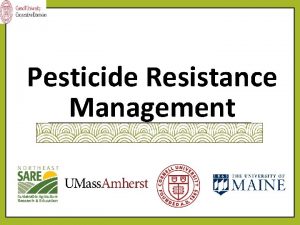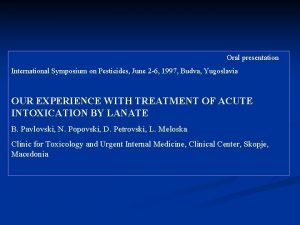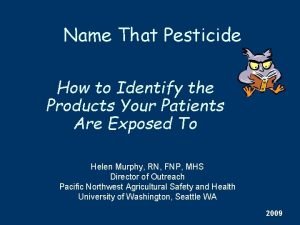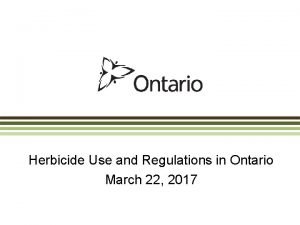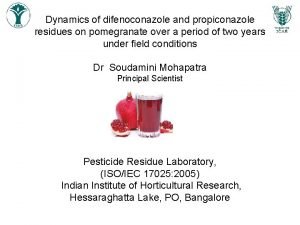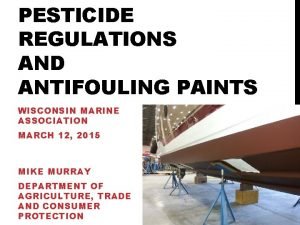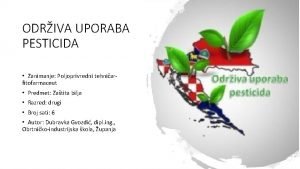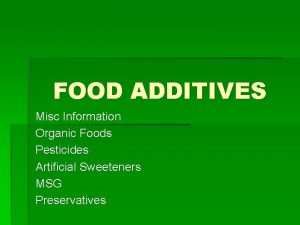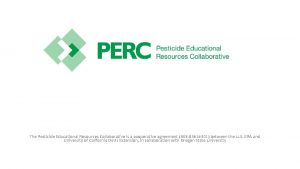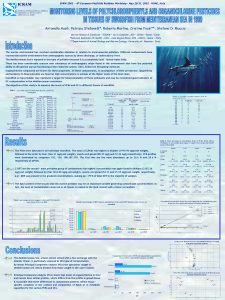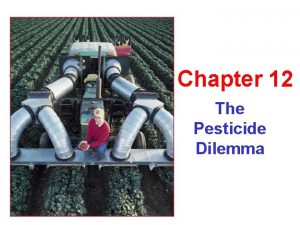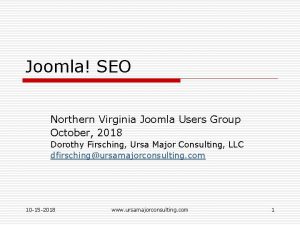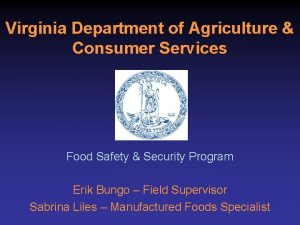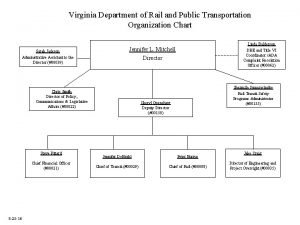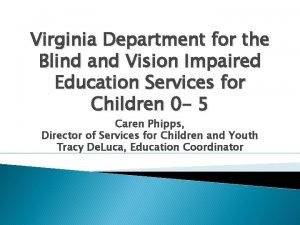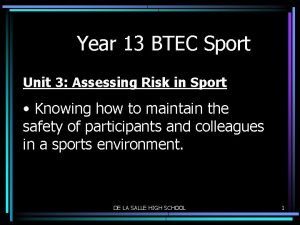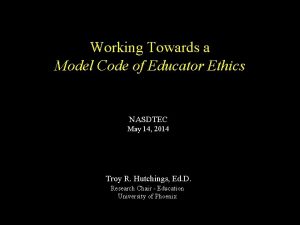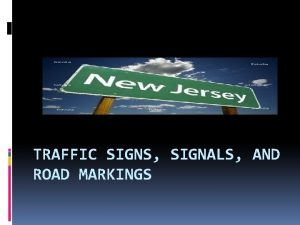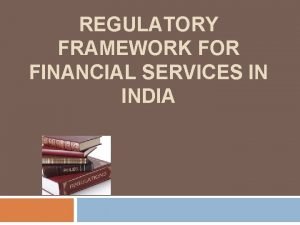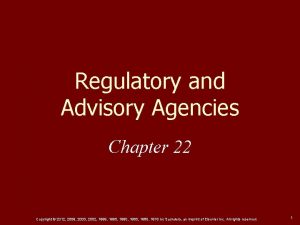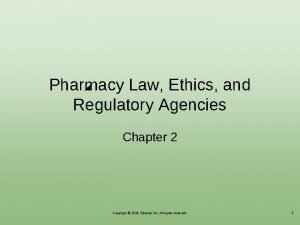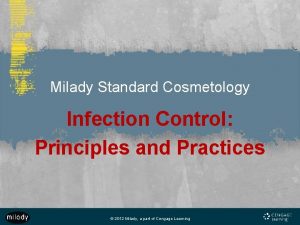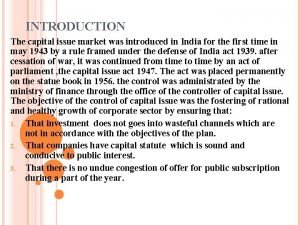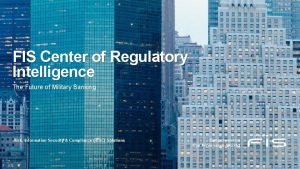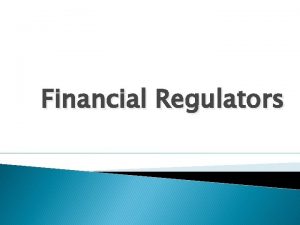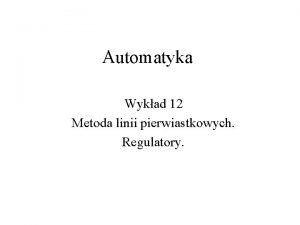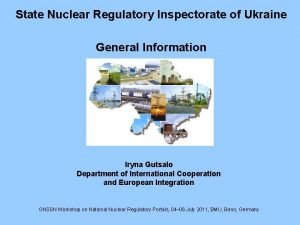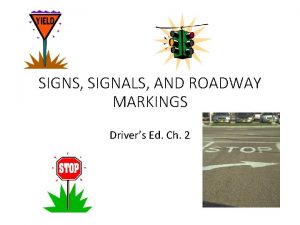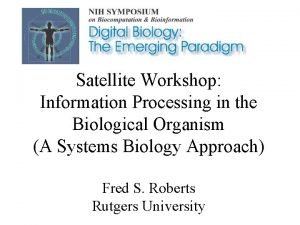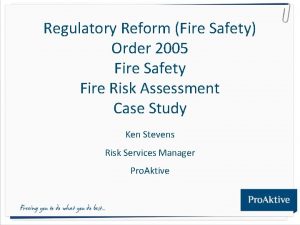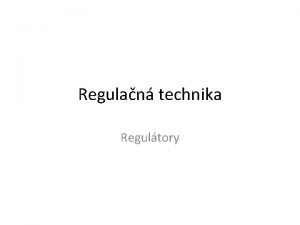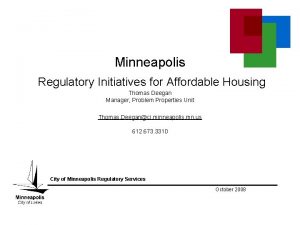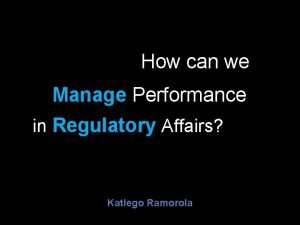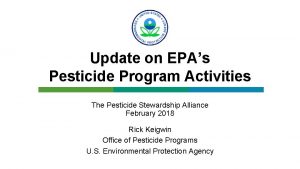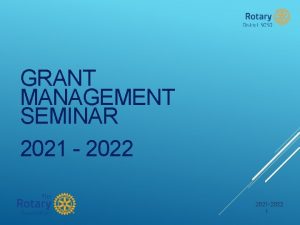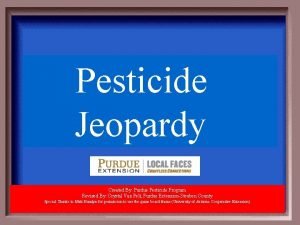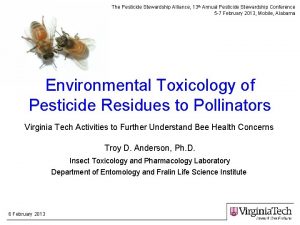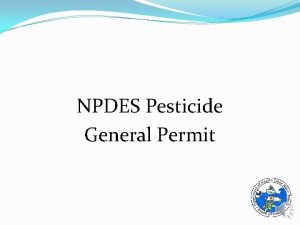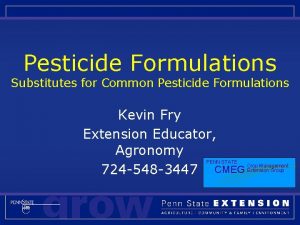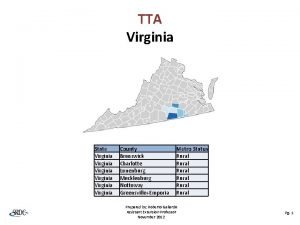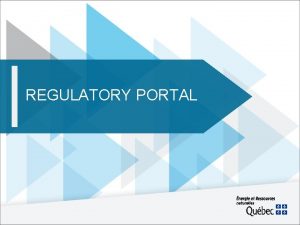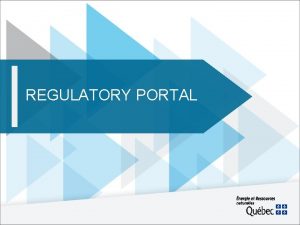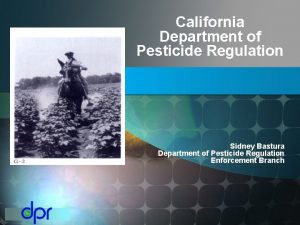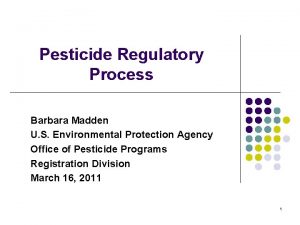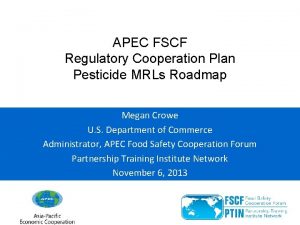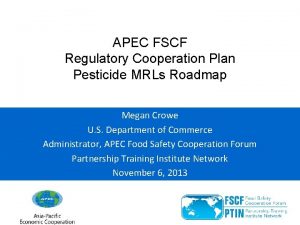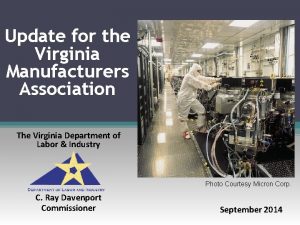2021 2022 PESTICIDE REGULATORY UPDATE Virginia Department of

















































- Slides: 49

2021 -2022 PESTICIDE REGULATORY UPDATE Virginia Department of Agriculture and Consumer Services Office of Pesticide Services 1

DISCUSSION POINTS • Regulatory Authority • Supervision • Common Violations & Enforcement Actions • Recordkeeping • Label is the Law • Pesticide Product Registration • Storage, Disposal & Recycling • Federal and State Regulatory Activities • Incident Reporting 2

THE REGULATION OF PESTICIDES • (Co)Regulated by the US Environmental Protection Agency and Virginia Department of Agriculture and Consumer Services (VDACS) • VDACS’ Office of Pesticide Services (OPS) administers the pesticide program and supports VDACS and the Board of Agriculture and Consumer Services (Board): • Protect consumers and the environment; and • Ensure the safe and effective control of pests that adversely affect crops, structures, health, and domestic animals. • OPS authority is derived from the Virginia Pesticide Control Act (Act) and the Regulations Pursuant to the Act (Regulations). • Staff also has federal credentials to enforce provisions of the Federal Insecticide, Fungicide and Rodenticide Act (FIFRA). 3

ü Certifying pesticide applicators to ensure they have the minimum competencies necessary to apply pesticides. ENSURING PROPER USE OF PESTICIDES All OPS activities work to ensure pesticides are used in accordance with the law and regulations. ü Registering pesticide products to ensure only those pesticides that meet the federal requirements for registration, with limited exceptions, are used. ü Licensing businesses to ensure they have knowledge of pesticides and evidence of financial responsibility. ü Conducting inspections and investigations to ensure pesticides are used properly and all other provisions of the Act & Regulations are met. ü Reviewing and approving recertification courses to ensure pesticide applicators receive the information required to maintain their certification. ü Coordinating recycling and collection programs to ensure to assist with the final 4 disposition of containers and unwanted

INSPECTIONS & INVESTIGATIONS • OPS conducts routine inspections and • Totality of evidence collected will be investigations to determine compliance reviewed in a two stage independent with all applicable laws & regulations; review process to determine if the • Standard inspection/investigation application was made in compliance with procedures may include: all applicable laws and regulations; • • Conducting interviews Visiting site Observing an application Taking photographs Collecting samples (residue/formulation) Collecting weather data Reviewing pesticide label and application records • Respondents will be notified of any alleged violations prior to any final enforcement action is taken; and • Should there be an enforcement action, for example, a monetary penalty, the respondent will have the right to appeal in keeping with the Administrative Process 5 Act.

VIOLATIONS ENFORCEMENT ACTIONS TYPES OF ENFORCEMENT ACTIONS VDACS can take enforcement action against any person, business or agency that violates any provision of the Virginia Pesticide Control Act, Regulations, or the Federal Insecticide, Fungicide and Rodenticide Act (FIFRA). • Letter of Caution • Civil Penalties per violation • Up to $1, 000 for a non-serious first time violation • Up to $20, 000 for knowing or repeat violations • Up to $100, 000 additional in the event of death or serious physical harm to any person. • Suspension, modification, revocation or denial of business license and/or applicator certification • Filing of criminal charges • Refer to U. S. Environmental Protection Agency 6 for federal action

FY 21 VIOLATIONS & ENFORCEMENT ACTIONS FOR NON-COMPLIANCE TOP 5 VIOLATIONS #1: Sale or Use of Unregistered Product • 109 Unique Cases • Civil Penalties = $23, 790 #2: Not Certified • Stop Sale = 37 #3: Misuse Including Negligence • Other Actions = 18 #4: No Business License • Letter of Caution #5: Recordkeeping • Advisory Letter 1 July 2020 - 30 June 2021 7

§ 3. 2 -3930. All applicators must be certified as a commercial applicator or a registered technician when making a pesticide application in exchange for compensation of any kind. § 3. 2 -3914. All pesticide sold, offered for sale, used, or offered for use in VA must be registered by paying an annual fee. 2 VAC 5 -685 -210. Commercial applicators not-for hire and registered technicians not-for-hire must maintain a record of every pesticide applied. The record must contain the 9 requirements listed. § 3. 2 -3932. In order to lawfully use or supervise the use of a RUP on any property, an applicator must be certified as a private applicator. Read, Understand Follow the Act and Regulations! § 3. 2 -3939. It is a violation to use or cause someone else to use a product in a manner that is inconsistent with the label or the regulations. § 3. 2 -3940(B)(3). It is a violation for a certified applicator to apply any pesticide in a negligent manner. § 3. 2 -3924. A business must have a pesticide business license in order to sell, distribute or store any pesticide unless the business meets one of the exemptions. If a person wants to apply or recommend for use any pesticide commercially, they must obtain a pesticide business license and employ a certified commercial applicator. 2 VAC 5 -680 -65. All licensed pesticide businesses must keep a record of every pesticide applied. The record must contain the 9 requirements listed. 8

APPEAL PROCESS: IF YOU DON’T AGREE INFORMAL FACT FINDING • Officer appointed by the Program Manager (Office of Pesticide Services) • Opportunity for respondent to offer additional information, ask questions • Officer is authorized to affirm, raise, lower, abate or negotiate a settlement • Decision can be appealed to FORMAL HEARING • Officer is Court appointed Attorney • Hears all relevant information and considers facts of all violations in the case • Makes recommendation to Board to affirm, raise, lower, abate or may recommend another outcome 9

THE LABEL IS THE LAW ALWAYS READ AND FOLLOW PESTICIDE PRODUCT LABELING It is a violation of Federal and state law to use any pesticide product in a manner inconsistent with its labeling. . . 10

THE LABEL IS THE LAW – “PESTICIDE USE” • In Virginia, "pesticide use" is defined as the application or supervision of an application of a pesticide. • This includes all of the routine activities that are part of a normal pesticide application: • mixing, • loading, • applying, • handling a pesticide after the container seal is broken, • clean up, and • storage and disposal of excess product & empty containers. 11

THE LABEL… • Is a legal agreement between the registrant, the EPA, the end-user and the State Lead Agency for pesticide regulation. • Mitigates the risk of the use of the pesticide to an acceptable level • Human Health • Environmental Health • Includes risk mitigation measures that may be implemented throughout label, for example: use rate; use site; PPE; weather conditions; buffer zones; storage; disposal, etc… • Prescribes proper use which ensures continued use and availability of pesticide. 12

IMPLICATIONS OF LABEL PROVISION “TO BE USED BY CERTIFIED APPLICATORS ONLY” RESTRICTED USE PESTICIDE To be used by certified applicators only; NOT to be used by uncertified persons working under the supervision of a certified applicator • While some restricted use pesticides allow uncertified persons to work under the supervision of a certified applicator, pesticides that contain the above statement may only be applied by certified (commercial and private) applicators (i. e. : Dicamba and Paraquat); and • Virginia’s Certified Registered Technicians do not meet the federal definition of a certified applicator thus are prohibited from making applications of any pesticide with the above statement (40 CFR Part 171). 13

PESTICIDE USE ON HEMP • All pesticides used on hemp must be registered federally by EPA or exempted • All pesticides used on hemp must be registered in Virginia including FIFRA 25(b) exempt products. • The labels must either list “hemp” as a use site, or the label language must be sufficiently broad to include hemp while not specifically prohibiting its use on hemp. • Additionally, for food uses • the active ingredient must be exempt from the requirements for a tolerance on all food crops, and; • have directions for use on unspecified food crops. 14

STORAGE • Store pesticides in original container in a well-ventilated area and away from food, pet food, feed, seed, fertilizers, and veterinary supplies. JUST SAY NO! • Avoid cross-contamination with other pesticides. Keep container closed to prevent spills and contamination • NEVER store pesticides, for even a short time, in a food or drink container. 15

PESTICIDE COLLECTION PROGRAM • The disposal of canceled, banned or unwanted pesticides poses a significant challenge to agricultural producers and other pesticide users due to its high cost. • Program Status • FY 2021 program collected a total of 61, 703 lbs. . • Since it’s inception, a total of over 1. 6 million lbs. has been collected For more information: . http: //www. vdacs. virginia. gov/pesticide-collection. shtml 16

2020 -2024 PESTICIDE COLLECTION PROGRAM 17

PLASTIC PESTICIDE CONTAINER RECYCLING • Provide agricultural producers, pesticide dealers and pest control firms with option for the disposal of properly rinsed pesticide containers. • Program Status • FY 2021 program recycled a total of 167, 298 lbs. . • Since its inception, a total of more than 2. 4 million lbs. . has been collected. For more information: http: //www. vdacs. virginia. gov/pesticide-container-recycling. shtml 18

REMINDER: CREDIT FOR RECERTIFICATION COURSE • • For all in-person courses, signatures are required on both the roster(s) and the Application for Recertification Credit. When a signature is requested, it is not optional for credit. The signatures should not be significantly different. Course sponsors/speakers seeking credit for attending their own course are required, like all attendees, to participate in the entire program and all sessions and complete all required forms as proof of attendance. Course sponsors can not self recertify rather the course must include presenters others than the course sponsor. To renew by attending a recertification training program requires completion of one recertification course every two years and submission of the renewal application and appropriate fees. * *Exception – Government employees and Private Applicators are exempt from renewal application and fees however must complete the recertification course requirement. 19

REPORTING REQUIREMENTS: ACCIDENTS AND INCIDENTS* • Certified commercial or private applicators or registered technicians shall report any pesticide accident or incident in which they are involved that constitutes a threat to any person, to public health or safety, or to the environment, as a result of the use or presence of any pesticide. • Includes both general use and restricted use pesticides. • No minimum amount. • Pesticide accidents/incidents should be reported to VDACS within 48 hours by phone and within 10 days in writing. • Reports include: • Name of individuals involved in accident or incident; • Name of pesticide involved; • Quantity of pesticide spilled and containment procedures; • Time, date, and location of accident or incident; • Mitigating actions taken; and • Name, or description if unnamed, and location of bodies of water nearby where contamination of such bodies of water could reasonably be expected to occur due to natural or manmade actions. *There may be other reporting requirements outside of the Act & Regulations… 20

PESTICIDE PRODUCT REGISTRATION ALL PESTICIDES • § 3. 2 -3914 of the Virginia Pesticide Control Act requires…Every pesticide manufactured, distributed, sold, offered for sale, used, or offered for use shall be registered … • Pesticides classified by EPA as 25(b) Exempt products are not exempt from state registration. • To check the state registration status of a pesticide or to find a registered pesticide for a specific pest visit the Pesticide Product Registration page of our website. http: //www. vdacs. virginia. gov/pesticide-productregistration. shtml RESTRICTED USE PRODUCTS (RUP) • For use only by certified (private or commercial) applicators or by certified registered technicians under the direct supervision of certified (private or commercial) applicators. • Restricted use products are designated as restricted use based on risk, for example: • Acute toxicity threat to humans & wildlife. • Ground water contamination concern. • Threat to aquatic organisms. 21

ECOMMERCE – BUYER BEWARE • Due diligence is required when purchasing pesticides via the internet. • Remember, all pesticides must be registered in Virginia…this includes those that are bought on the internet. • All pesticide businesses are required to have a license to sell pesticides in Virginia…this includes businesses that sell pesticides on the internet. • There are limited exceptions to the business license requirements for businesses • To check if a pesticide business is licensed to sell pesticides in Virginia: http: //www. vdacs. virginia. gov/pdf/reports-businesses. pdf 22

VIRGINIA REGULATORY ACTIVITIES 2 VAC 5 -675 Regulations Governing Pesticide Fees • Current fees became effective July 11, 2019: • Product registration fee $225 initial and annually thereafter; • Pesticide business license fee $150 initial and annually thereafter; • Certification fee: • Commercial applicators $100 initial and biennially thereafter; and • Registered technicians $50 initial and biennially thereafter. • On July 20, 2021, Board of Agriculture and Consumers Services directed staff to begin the regulatory process to eliminate the fee for pesticide applicator renewals • Applicators will still required to maintain their certification by attending a recertification course every two years; and • Applicators that do not renew by August 29 of a given year will be required to submit an application with fee to take the certification exam. Stay Tuned…. 23

IN OTHER VIRGINIA NEWS • Applicator certification, business licensing and product registration is going online! • Slotted to Go Live in Fall 2021. • This is an option, not required. • Online submission of payments. • LOAs, certificates, licenses and registration will be sent electronically and can be downloaded and printed. • Expected to reduce the overall time from start to finish. 24

PROTECTING POLLINATORS VOLUNTARY PLAN TO MITIGATE THE RISK OF PESTICIDES TO MANAGED POLLINATORS • Voluntary, proactive approach which focuses on enhanced communication and coordination between pesticide applicators and beekeepers. • Beekeepers providing information regarding the location of their hives; and • Pesticide applicators providing advance notice of applications that have the potential to impact managed pollinators. • To facilitate the communication, VDACS has acquired an online mapping tool: • Agricultural producers and pesticide applicators can register with Field. Check® to view the locations of hives in the application area and notify beekeepers of planned applications. • Beekeepers can use Bee. Check™ to map the location of their hives. 25

FIELDCHECK ® FOR APPLICATORS • Field. Check is the online and mobile portal for applicators • Field. Check is free to register for pesticide applicators • Field. Check data may be streamed to Precision Ag platforms • Field. Check provides location and contact information to promote communications between specialty crop growers, beekeepers, and applicators • Field. Check may be used by applicators spraying lawns, mosquito abatement, right of way, and vegetation management • Pesticide applicators should register in Field. Check to maximize benefits 26

APPLICATOR ACCESS – THREE WAYS • Public Map (FREE) • All crop sites • Most beehives • Register with Field. Check (FREE) • All beehives • Email notifications of new sites • Member Data Subscription • All sites • Downloadable or live stream through software provider For information; https: //va. driftwatch. org/ 27

NEW FOR USERS – MOBILE APPS! ü Field. Check for Applicators ü Bee. Check for Beekeepers • Map: Detailed Site, Contact View, Find Sites Near Me • Options on defined “Alert Area” • Notification when sites added or removed • Increased functionality and visibility • API design to communicate with other technology platforms • Available for FREE on Apple/Android systems • Increased functionality; ease of moving hives with GPS • Same security functions (allows for privacy) • Available for FREE on Apple/Android systems 28

CERTIFICATION WHOSE RESPONSIBILITY IS IT ANYWAY? • For certified applicators including commercial applicators, registered technicians, and private applicators, it is YOUR responsibility to maintain your certification including being sure… • OPS has your current mailing address • Must complete a “Change of Information Form” to process any changes; • Know when your certification expires and renew your certification before it expires; • Attend a recertification course prior to the expiration date of your certification; • Sign your name on the course roster and complete and sign your recertification application form; and • Complete and sign your renewal application form and submit it along with fees. 29

COMMERCIAL APPLICATORS & REGISTERED TECHNICIANS Required additional information for all recertification courses for Commercial Applicator and Registered Technicians. 30

REMINDER: COMMERCIAL APPLICATORS& REGISTERED TECHNICIANS IT IS YOUR RESPONSIBILITY TO MAINTAIN YOUR CERTIFICATION • Maintaining your pesticide applicator certification is a two-step process and includes both attending a recertification course approved for the category(s) of applications you are certified to make and renewing your pesticide applicator certificate. • Recertification – Currently certified applicators are required to attend an approved category specific recertification course for each category they hold every 2 years before their certificates expires; and • Renewal – Currently certified applicators are required to submit completed renewal applications plus the renewal fees* by June 30 as reflected in the expiration date on their certificates. Applicators will either renew in and odd or even year cycle per their listed expiration date. (*Government employees are exempt from renewal application and fees however must complete the recertification course requirement) • If an applicator does not renew by June 30, the applicator is not allowed by law to apply pesticides. • After August 29, an applicator can no longer renew an expired certificate and will have to reinstate it by examination. 31

REMINDER: COMMERCIAL APPLICATORS & REGISTERED TECHNICIANS If you opt to test in lieu of attending a recertification course: • YOU MUST SUBMIT YOUR RENEWAL APPLICATION AND APPROPRIATE FEE; AND • YOU MUST SUBMIT A TESTING APPLICATION AND APPROPRIATE FEE. Two separate applications and two separate fees are required. 32

SUPERVISION REQUIREMENTS: REGISTERED TECHNICIANS • Only certified Commercial Applicators may supervise certified Registered Technicians (RT) • Certified Registered Technicians must have direct supervision by a certified Commercial Applicator to use Restricted Use Pesticides (RUPs) • Certified Commercial Applicators • Must provide instructions on safe use • Must be accessible within telephone or radio contact, or on site • Is responsible for actions of the RT • Certified Registered Technicians may use General Use Pesticides without supervision 33

SUPERVISION REQUIREMENTS: TRAINING REGISTERED TECHNICIANS • Only Certified Commercial Applicators may supervise the use of pesticides • Prospective pesticide applicators (persons in training) must have DIRECT ON-SITE supervision to use any pesticide • Certified Commercial Applicator • Must provide instructions on safe use • Must be on site • physically present on the property upon which the pesticide is being applied • in constant visual contact with the person applying the pesticide. • Is responsible for actions of uncertified person • Training must be documented and submitted to VDACS 34

TRAINING REGISTERED TECHNICIANS: PROOF OF ADDITIONAL CATEGORY SPECIFIC TRAINING • Only Certified Commercial Applicators may supervise the use of pesticides • The CCA trainer must submit a completed additional training form for the RT changing or adding categories. • Training must be documented and submitted to VDACS within 10 calendar days of completion of such training. 35

REMINDER: GOVERNMENT EMPLOYEES • All Government employees who apply pesticides are required to be certified: • Commercial Not-for-Hire; or • Registered Technician • Certification is valid only when applying or supervising application of pesticides used by such governmental agencies. • Do not work for a “pesticide business” so are not required to have a certified commercial applicator on Staff, however, only certified commercial applicators can train registered technicians. • That means, Governmental agencies need to: • Have a certified commercial applicator on Staff to train prospective registered technicians; or • Work with other Governmental agencies with a certified commercial applicator to train new prospective registered technicians; or • Hire or otherwise retain a certified commercial applicator to train prospective registered technicians. • In all cases, the certified commercial applicator must be certified in the category in which the registered technician will be working! 36

-CLARIFICATIONVOLUNTEERS MAKING PESTICIDE APPLICATIONS • That means…certification and • All state agencies, municipal recordkeeping requirements corporations or other governmental agencies shall be subject to the • Apply to persons who are not provisions… employees of the agency, but are authorized by the agency to • Individuals, employees or perform functions; and representatives…shall be certified as commercial applicators or • Include volunteers making a registered technicians for the use pesticide application under the of pesticides covered by the auspices of the government applicant's certification. • for example, state parks. 37

BUSINESS LICENSES WHOSE RESPONSIBILITY IS IT ANYWAY? • For pesticide businesses including those that sell, distribute, or store any pesticide or apply or recommend for use any pesticide commercially, it is the business owner/operator’s responsibility to maintain the pesticide business license including being sure… o OPS has the business’ current mailing address o Must complete a “Change of Information Form” to process any changes; o Know when the business’ license expires and renew the business’ license before it expires; o The business’ Certificate of Insurance is current and valid; o The business has, if applicable, a currently certified commercial applicator of record who is responsible for (i) the safe application of the pesticides; and (ii) providing recommendations for the use of pesticides; and o Businesses which sell restricted use pesticides, or distribute restricted use pesticides for purposes of selling, must employ a certified commercial applicator of record who is present 38 and bears immediate responsibility for the correct and safe operation of the location or outlet. .

REMINDER: PESTICIDE BUSINESS LICENSES • All business licenses expire on March 31; • If not renewed by March 31, • The business is not licensed and cannot conduct business until such time as the licensed is renewed, for example, sell or apply pesticides; and • The certificates of all pesticide applicators working for the business are inactive, therefore, applicators may not apply pesticide until the business license is renewed. • Proof of insurance is required to maintain a business license. It is the business’ responsibility to ensure that a current certificate of insurance is on file throughout the license year: • If the certificate of insurance expires at any time during the year, the pesticide business license is considered unlicensed and cannot conduct business; and • The certificates of all pesticide applicators working for the business are inactive, therefore, applicators may not apply pesticide until the business license is valid. 39

PESTICIDE FEES : NON-REFUNDABLE AND NON-TRANSFERABLE • Fees are assessed to offset the cost of processing applications for: • Certified applicators (commercial & registered technicians); • Business licenses; and • Product registration. • Once applications are processed, regardless of if the credential is issued, fees will not be refunded. • Fees are transaction specific (i. e. fees paid for one prospective applicator's credential cannot be used to pay for a second prospective applicator's credential). • Refunds, if due, are transaction specific. Refunds cannot be applied to offset another fee. 40

RECORDKEEPING • For pesticide businesses (commercial applicators and registered technicians) • For commercial applicators not for hire and registered technicians not for hire 41

RECORDKEEPING ELEMENTS 1. Name, address, and telephone number of customer and address or location, if different, of site of application; 2. Name and certification number (or certification number of the supervising certified applicator) of the person making the application; 3. Day, month and year of application; 4. Type of plants, crop, animals, or sites treated and principal pests to be controlled; 5. Acreage, area, or number of plants or animals treated; 6. Brand, trademark, or product name appearing on the product's label; 7. EPA registration number; 8. Amount of pesticide concentrate and amount of diluent used, by weight or volume, in mixture applied; and 9. Type of application equipment used. 42

IF YOU DON’T KNOW…ASK US! Program Manager 804 -371 -6559 Environmental Programs 804 -371 -6561 Enforcement & Field Operations 804 -371 -6560 Certification, License Registration, & Training (CLRT) 804 -786 -3798 Compliance 804 -371 -8485 http: //www. vdacs. virginia. gov/pesticides. shtml Email: opsclrt. vdacs@vdacs. virginia. gov 43

PRIVATE APPLICATORS Required additional information for all recertification courses for Private Applicators 44

REMINDER: PRIVATE APPLICATOR CERTIFICATION IT IS YOUR RESPONSIBILITY TO MAINTAIN YOUR CERTIFICATION • Maintaining your pesticide applicator certification is a two-step process and includes both attending a recertification course approved for the category(s) of applications you are certified to make and renewing your pesticide applicator certificate. • Recertification – Currently certified applicators are required to attend approved category specific recertification courses for each category they hold every 2 years before their certificates expire; and • Renewal – If an applicator has the required recertification credit, their certificate will be automatically renewed. • If an applicator does not renew December 31, they are not allowed by law to apply pesticides. • Applicators are granted 60 days after December 31 to obtain recertification credit to renew their expired certificate, otherwise they will have to be reexamined. • After the 60 day grace period, the only way to renew their certificate is by examination. 45

RECORDKEEPING • For Private Applicators • Requirements under the Worker Protection Standard (WPS); and • Requirements for the use of Restricted Use Pesticides (RUP). 46

WORKER PROTECTION STANDARD RESTRICTED USE PESTICIDES Pesticide records must contain: The 9 required elements that must be recorded within 14 days of each RUP application are as follows: 1. 2. 3. 4. 5. 6. Name of the pesticide applied, Active ingredient, EPA registration number, REI, Crop or site treated, Location and description of the treated area(s), Date(s) and times application started and ended, and 7. Safety Data Sheet of the pesticide applied. Pesticide records must be maintained for any covered use of a WPS labeled pesticide for either general-use or restricted-use pesticides. 1. 2. 3. 4. 5. 6. The brand or product name, The EPA registration number, The total amount applied, The month, day, and year, The location of the application, The crop, commodity, stored product, or site, 7. The size of area treated, 8. The name of the certified applicator, and 9. The certification number of the certified applicator. 47

FEDERAL WORKER PROTECTION STANDARD 40 CFR Part 170, Worker Protection Standard, Revised in 2015 • Goal to reduce pesticide poisonings and injuries among agricultural workers and pesticide handlers. • All requirements of the revised WPS are now in effect. • Related WPS resources, including the revised How to Comply Manual, are available online -EPA Worker Protection Standard webpage: https: //www. epa. gov/pesticide-worker-safety/agricultural-worker-protection-standard-wps -Pesticide Educational Resources Collaborative (PERC) http: //pesticideresources. org// • Contact Marlene Larios, Program Coordinator, at VDACS for assistance finding WPS resources. Email: Marlene. Larios@vdacs. virginia. gov or Phone: 804 -786 -8934 48

IF YOU DON’T KNOW…ASK US! Program Manager 804 -371 -6559 Environmental Programs 804 -371 -6561 Enforcement & Field Operations 804 -371 -6560 Certification, License Registration, & Training (CLRT) 804 -786 -3798 Compliance 804 -371 -8485 http: //www. vdacs. virginia. gov/pesticides. shtml Email: opsclrt. vdacs@vdacs. virginia. gov 49
 Virginia pesticide registration
Virginia pesticide registration Database backup and recovery techniques
Database backup and recovery techniques Department of licensing and regulatory affairs
Department of licensing and regulatory affairs 2021-2022 q1 9 week world geography cba
2021-2022 q1 9 week world geography cba Semakan hlp kkm 2022
Semakan hlp kkm 2022 Jakttider bäver 2021
Jakttider bäver 2021 Timeline 2021 2022
Timeline 2021 2022 Www sab update com
Www sab update com Pesticide resistance
Pesticide resistance Pesticide resistance
Pesticide resistance Lanate pesticide
Lanate pesticide Pesticide classification chart
Pesticide classification chart Herbicide license ontario
Herbicide license ontario Agriculture pesticide difenoconazole
Agriculture pesticide difenoconazole Wisconsin pesticide applicator license
Wisconsin pesticide applicator license Tablica za pesticide
Tablica za pesticide Msg pesticide
Msg pesticide Pesticide educational resources collaborative
Pesticide educational resources collaborative European pesticide residue workshop
European pesticide residue workshop Types of pesticides
Types of pesticides Seo northern virginia
Seo northern virginia Virginia department of agriculture food safety
Virginia department of agriculture food safety Virginia department of historical resources
Virginia department of historical resources Virginia department of rail and public transportation
Virginia department of rail and public transportation Virginia department for the blind and vision impaired
Virginia department for the blind and vision impaired Unit 3 assessing risk in sport
Unit 3 assessing risk in sport Dispositional framework vs regulatory framework
Dispositional framework vs regulatory framework The purpose of traffic signs are
The purpose of traffic signs are Regulatory framework for financial services in india
Regulatory framework for financial services in india Chapter 22 regulatory and advisory agencies
Chapter 22 regulatory and advisory agencies Pharmacy law ethics and regulatory agencies
Pharmacy law ethics and regulatory agencies Infection control milady
Infection control milady Functions of sebi
Functions of sebi Functions of financial system
Functions of financial system Regulatory change management process
Regulatory change management process Objective of irda
Objective of irda Diversity and regulatory challenges
Diversity and regulatory challenges Sign shapes meaning
Sign shapes meaning Regulatory capital vs economic capital
Regulatory capital vs economic capital Regulatory capital vs economic capital
Regulatory capital vs economic capital Metoda linii pierwiastkowych
Metoda linii pierwiastkowych Gene regulatory network
Gene regulatory network Infoatoms
Infoatoms A sign that alerts you to possible hazards
A sign that alerts you to possible hazards Gene regulatory network
Gene regulatory network Regulatory reform fire safety order 2005
Regulatory reform fire safety order 2005 Bbfc media aspects covered
Bbfc media aspects covered Nespojité regulátory
Nespojité regulátory Minneapolis regulatory services
Minneapolis regulatory services Kpi regulatory affairs
Kpi regulatory affairs
